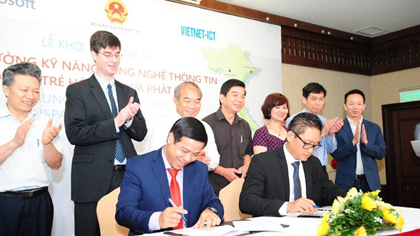Microsoft-funded project to enhance IT skills for children in remote regions
A Microsoft-funded project aiming to enhance IT skills for young people’s integration and development, was kicked off at a ceremony held in Hanoi on June 7.
The project is expected to narrow digital gaps, inspire young people’s passion for IT, and develop their knowledge and skills in Computer Science, computational thinking and IT application by building new documents and organising training courses for teachers and pupils in disadvantaged regions.
 |
| Representatives from Microsoft Vietnam and Vietnet-ICT sign documents to launch the project. |
In its initial phase, the project will help build a new Computer Science and IT curriculum in targeted secondary schools, including ethnic boarding schools, secondary schools and continuing education centres in several provinces and cities, as well as organise pilot classes in extracurricular hours in the coming 12 months.
The training activities are expected to help over 300 teachers and approximately 50,000 learners access IT and Computer Science skills with active and motivating learning methods. After a pilot period, they will be rolled-out nationwide in the future.
Addressing the launching, Director of the Department of Information Technology under the Ministry of Education and Training (MoET) Nguyen Son Hai stressed that with such targets, the project would develop documents to train both teachers and students in modules focusing on applicability to help students solve several fundamental application problems in line with the IT subjects currently taught in each school.
E-learning lessons for teachers will be built on the MoET’s portal, providing references for all IT teachers nationwide.
Since 2012, the Microsoft Vietnam has worked with the Vietnet Information Technology and Communication Center (Vietnet-ICT) and other partners to implement IT and IT application skill training programmes for nearly 10,000 disadvantaged young people in remote regions to seek jobs and begin businesses. The project has provided mini-MBA courses, start-up promotion activities, basic and advanced IT skills training and career orientation while supporting over 60,000 young people to access to Computer Science skills via the ‘Programming Hour’ campaign.
(Source: NDO)
 về đầu trang
về đầu trang





